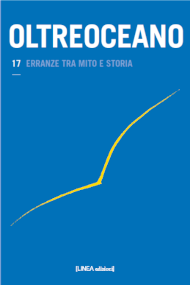La réécriture du mythe dans la littérature migrante au Québec: Antigone d’Antonio D’Alfonso
DOI:
https://doi.org/10.53154/Oltreoceano1Keywords:
mythe, Antigone, réécriture, littérature migrante, transmédialitéAbstract
La réécriture de l’Antigone de Sophocle est une opération qu’Antonio D’Alfonso, écrivain, poète, réalisateur et photographe canadien d’origine italienne, développe tout au long de son oeuvre, en se servant de plusieurs supports et de plusieurs langues. Antigone assume le rôle d’un personnage-matrice à l’origine d’un récit qui absorbe le texte grec pour amplifier des thèmes propres à
l’imaginaire de l’auteur.
The Rewriting of Myths in Québec migrant writing: Antigone by Antonio D’Alfonso
Antonio D’Alfonso undertakes the project of rewriting Antigone throughout his work as a writer, poet, director and photographer of Italian origin, by using different media and languages. Antigone becomes a character-matrix at the origin of a narrative that absorbs the Greek text to amplify the themes of D’Alfonso’s creative production.
La riscrittura del mito della letteratura migrante in Québec: Antigone di Antonio D’Alfonso
La riscrittura dell’Antigone sofoclea è un’operazione che Antonio D’Alfonso, scrittore, poeta, regista e fotografo canadese d’origine italiana, sviluppa nel corso di tutta la sua opera, servendosi di più supporti e più lingue. Antigone si configura come personaggio-matrice all’origine di una narrazione che assorbe il testo greco per amplificare dei temi propri dell’immaginario dalfonsiano.
Downloads
References
Corriere canadese (2012/02/23): Antigone, la trasposizione di una poesia sul grande schermo. Tiré de https://www.corriere.ca/archivio/
Bernier, S. (2002): Les Héritiers d’Ulysse. Montréal: Lanctôt.
Bosco, M. (1974): New Medea: ébauche pour un drame. Montréal: L’Actuelle.
Cacchioli, E. (2018): Relectures du mythe d’Antigone dans les littératures francophones extra-européennes. Paris: L’Harmattan.
Cocteau, J. (1923/02/10): À propos d’Antigone. Gazette des sept arts. Tiré de http://archive.wikiwix.com/cache/index2.php?url=https%3A%2F%2Fcocteau.biumontpellier.fr%2Findex.php%3Fid%3D24
Cocteau, J. (1927): Antigone. Les Mariés de la Tour Eiffel. Paris: Gallimard.
D’Alfonso, A. (1979): Queror. Montréal: Guernica.
D’Alfonso, A. (1990): Avril ou l’anti-passion. Montréal: VLB.
D’Alfonso, A. (1996): In Italics. Toronto: Guernica.
D’Alfonso, A. (1998): L’apostrophe qui me scinde. Montréal: Noroît.
D’Alfonso, A. (2004): Un vendredi du mois d’août. Montréal: Leméac.
D’Alfonso, A. (2004): Antigone: a Translation of a Play by Sophocles. Toronto: Lyricalmyrical.
D’Alfonso, A. (2005): Un homme de trop. Montréal: Noroît.
D’Alfonso, A. (2007): L’aimé. Montréal: Leméac.
D’Alfonso, A. (2010): Antigone [Film].
D’Alfonso, A. (2015): Antigone. A film script adapted from the play by Sophocles. Victoria / Banff: Ekstasis.
D’Alfonso, A. (2016): Poetica del plurilinguismo. Per evitare una Babele post-moderna. Trad. de N. Gasbarro & G. De Gasperi. Fanna: Samuele.
D’Alfonso, A. (2017): Antigone. Une adaptation de la pièce de Sophocle. Montréal: Noroît.
D’Alfonso, A. (2020): A Two Headed Man. Poems 1970-2020. Toronto: Guernica.
Ferraro, A. (2007): Le cycle théâtral de Wajdi Mouawad (Littoral, Incendies, Forêts) ou comment détourner le mythe d’Œdipe. Ponti / Ponts. Langues, littératures, civilisations, Présences du mythe, 7, pp. 41-56.
Mee, E. B. & Foley, H. P. (2011): Antigone on the Contemporary World Stage. Oxford: Oxford University Press.
Mouawad, W. (2010-2012): Le Sang des promesses, I-IV. Arles / Montréal: Actes Sud / Leméac.
Sadkowski, P. (2011): Récits odysséens: le thème du retour d’exil dans l’écriture migrante au Québec et en France. Toruń: Wydawnictwo Naukowe uniwersytetu Mikołaja Kopernika.
Steiner, G. (1984): Antigones. New York: Oxford University Press.
Downloads
Published
How to Cite
Issue
Section
License

This work is licensed under a Creative Commons Attribution-NonCommercial-ShareAlike 4.0 International License.
The authors undertake to comply with the following conditions, which are considered accepted at the time of submission of their contributions.
The sending of a text implies that it is unpublished and not submitted to be published elsewhere.
1. If accepted, the author shall confer on the publisher the right to publish and distribute it both in paper form and in the online electronic edition. The published articles will be downloadable and made available in open access.
2. Provided that it correctly indicates that the first publication took place in the journal Oltreoceano. Rivista sulle migrazioni the author has the right to: a) reproduce the article in separate extracts or collected in a volume; b) publish the article on their personal website or teaching site provided that these sites are of a non-commercial nature; c) deposit the article in online archives of a non-commercial nature, linked to the institution they belong to or as part of projects for the non-commercial dissemination and open access of scientific works.
The use of contributions by third parties, for commercial or otherwise unauthorized purposes, is not allowed. The publisher declines all responsibility for the unauthorized use of the material published in the journal.












